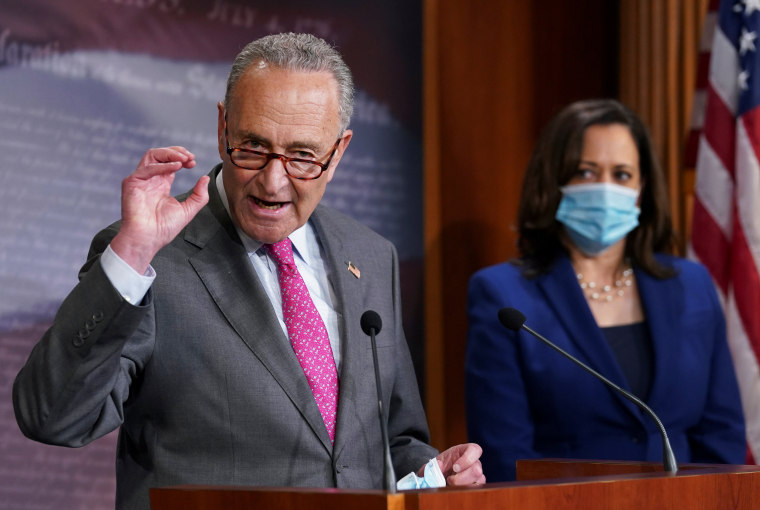WASHINGTON — Senate Democrats Tuesday said they plan to block a vote on Republican legislation to reform policing guidelines, calling it "irrevocably flawed" and setting up a stalemate in the Senate over how to address police violence in the midst of national protests over the issue.
The move among Democrats to oppose the measure undercuts plans by Senate Majority Leader Mitch McConnell, R-Ky., to hold a procedural vote Wednesday to move onto debating the legislation. That vote needs the support of at least 60 senators to pass, meaning that seven Democrats would have to join all Republicans.
But Democrats say they don’t believe the president is willing to work toward a solution and they are skeptical of McConnell’s intentions in moving forward with the GOP bill, speculating that he is putting forward a half-baked effort.
Senate Democratic Leader Chuck Schumer, who called the GOP bill “deeply, fundamentally and irrevocably flawed,” said that McConnell's "plan appears to be designed to get the burden of dealing with policing reform off Republican shoulders by setting up a process which is guaranteed not to result in successful legislation,” Schumer said.
“He’s setting this up for failure so he can check a political box,” Sen. Cory Booker, D-N.J., added.
Booker and Sen. Kamala Harris, D-Calif., the chamber's two Black Democrats, helped to write the version of the reform bill that is being voted on in the House on Thursday. They asked McConnell in a letter Tuesday morning for “bipartisan talks to get to a constructive starting point.”
McConnell suggested that he will move forward with the vote on Wednesday regardless, telling reporters that Democrats "don't have to trust me when I say I want an open amendment process. I mean it, but if they don't feel like they're had fair treatment, their remedy is to refuse to finish the bill.”
House Speaker Nancy Pelosi said last week that she’d support negotiating with the Senate after they vote on a bill in a conference committee. When asked why he doesn’t support that process, Schumer said, “if you want to get to conference you need a bipartisan process to start or you will never get to conference. That’s the flaw of McConnell’s proposal.”
The Republican and Democrats bill are dramatically different. Unlike the Democratic version, the GOP bill doesn’t call for an outright ban on chokeholds, it collects data on no-knock entries instead of bans them and it doesn’t touch the defense of qualified immunity, which Democrats eliminate.
“I think there's going to be a price to be paid for it,” Sen. John Cornyn, R-Texas, who is running for re-election this year, said. “I'm for holding them accountable, I'm not for helping them out of the ditch that they've gotten themselves in.”
Democrats were bolstered by the support of civil rights groups, including the NAACP, which urged them not to advance legislation that they call inadequate.
The organization said the GOP bill “fails to respond to decades-long demands for police accountability and reforms.”
“In this moment, we cannot support legislation that does not embody a strong accountability framework for police officers and other law enforcement who engage in misconduct as well as needed reforms to policing practices,” the letter continues.
As both sides hardened in their positions Tuesday, a bipartisan group of six senators who have been instrumental in crafting each party’s legislation — Republican Senators Scott, Lindsey Graham of South Carolina, Marco Rubio of Florida and Democratic Sens. Booker, Harris and Dick Durbin of Illinois — met behind closed doors.
Booker said it was just a conversation and talks haven’t formalized into a bipartisan working group.
Meanwhile, Sen. Mike Braun, R-Ind., introduced legislation that that would scale back the qualified immunity defense for police officers, a reform that most Republicans don’t support.
Braun told NBC News that Republicans are “a little timid in what we want to do” regarding police reform. “If we want to do something that's going to change the dynamic, I think you got to have some discussion of qualified immunity,” he said.


